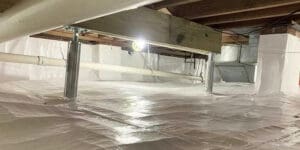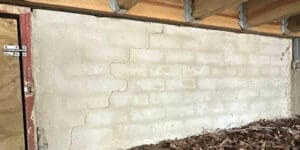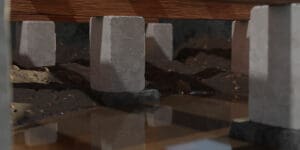Discovering a crack in your home’s foundation walls can be unsettling, as this could indicate catastrophic damage to your home’s foundation, which could necessitate costly repairs. However, if you have noticed a crack in your foundation, you may be curious to know if all foundation wall cracks are the same or if some are more concerning than others.
Looking at the crack can tell you a lot about the damage to your foundation, including what caused it and how severe the problem is. Here is a quick overview of the most common types of foundation cracks by foundation wall crack repair experts at HydroHelp911 to help you understand foundation damage.
Horizontal Cracks
Horizontal cracks in the foundation of your basement are dangerous. This type of crack is frequently caused by unstable soil and hydrostatic water pushing against your foundation wall. You may notice that the foundation is bowing inwards and that water is leaking into your basement. Horizontal cracks can appear in both blocks and poured foundations.
Horizontal cracks in the foundation walls, as observed by HydroHelp911 experts, are found below grade near the frost line and are frequently caused by the freeze-thaw cycle. This can cause poorly balanced pressure on your foundation wall, resulting in a horizontal crack.
Stair Step Cracks
According to foundation crack repair specialists at HydroHelp911, stair-step cracks are common in block foundations walls. These cracks occur along mortar joints and pose a significant threat to the structural integrity of your basement foundation. Two factors commonly cause stair-step cracks:
- One area of the foundation is sinking or settling.
- Moisture issues outside of your foundation.
Hairline Crack
In new construction foundations across the country, hairline cracks in the foundation walls are standard. They typically appear within a year and are caused by the new foundation settlements and drying.
Vertical Cracks
As observed by crack repair experts of HydroHelp911, vertical foundation wall cracks are less significant than horizontal cracks and therefore do not pose a structural hazard. They’re mainly encountered in poured foundations that run straight up and down your wall. However, vertical cracks are among the most common basement cracks in the USA. They are caused by the foundation settling over time or the natural curing process of concrete.
Diagonal Cracks
Most diagonal foundation cracks, like vertical cracks, do not pose a severe threat to the structural integrity of your foundation. They can be found running up to 30 degrees steep and are caused by the natural healing of the concrete foundation wall or settlement over time. If you encounter a diagonal crack, take a photo and record the date. You should not be concerned if the crack is a hairline and a quarter cannot fit into it. Check back in 6 months, and if the crack has grown larger, ask for guidance from a foundation crack repair professional like HydroHelp911.
Shrinkage Cracks
Shrinkage foundation cracks arise when poured concrete foundations dry out and lose moisture. Within the first year of construction, new homes are prone to shrinkage cracks. These cracks are frequently vertical and pose no structural risk to your foundation. The greatest danger is living in an area with high levels of radon gas, which can leak into your basement.
If the cracks grow or you notice more cracks, consider having an epoxy crack injection repair done.
Foundation Slab Cracks
Poured concrete slabs are susceptible to cracking over time. The difficulty is deciding why the foundation slab broke. There are three common reasons for this:
Curing of Concrete: The primary reason is the concrete slab’s natural drying, settling, and healing. But, again, this is mostly purely aesthetic and poses no structural risk.
Slab Settlement: If your new foundation slab develops settlement problems, you’re in serious trouble. It could be due to poor artistry, such as not compacting the supporting ground or poor soil conditions. Immediately contact a foundation wall crack repair professional like HydroHelp911 for an inspection.
Frost Heave: Crawl space slab foundations at or above grade are vulnerable to frost heave. The water beneath the slab can freeze during freezing temperatures, causing the concrete to lock.
Non-Structural Foundation Crack
A non-structural foundation cracks one which does not endanger the home’s structure and typically causes leaks only during rainstorms or when the snow melts. Considering the absence of a structural threat, water seeping into your basement is a serious issue that must be addressed.
Water leakage into your home can damage your possessions, walls, and floors, as well as contribute to mold growth. These types of cracks in foundation walls may worsen if left unsupervised, according to HydroHelp911. It will only be a matter of time before you discover that water has entered your home if you don’t act quickly to address a crack in your basement, no matter how minor it appears.
Wet Non-Structural Foundation Crack
This type of crack is caused by foundation shrinkage due to the moisture evaporating from the concrete. It usually takes place within the first month of laying a foundation. The more wet the concrete mix is at the start, the more shrinkage occurs, increasing the probability of cracks forming. Cracks can also develop due to the concrete’s natural setting. Foundation wall crack repair experts HydroHelp911 typically use urethane to seal wet and actively leaking foundation cracks. Whenever water comes into contact, it expands to fill the cavity and becomes a flexible substance quickly injected into the crack.
Structural Foundation Crack
Such types of cracks are hazardous because they jeopardize the structural integrity of your home. Horizontal cracks and cracks wider than 1/4 inch are sure signs of a structural flaw. Movement, whether caused by temperature changes, soil pressure, or soil shrinkage, is probably the cause of structural foundation cracks.
Therefore, epoxy is the best material for repairing the crack. Because the damage was initially caused by stress caused by movement, which can continue, epoxy alone is not usually sufficient to ensure crack repair. Additional reinforcement, such as carbon fiber countersunk staples or straps, is frequently needed to assure that the crack does not enlarge.
See what is Hydrostatic Pressure! Get a First-Hand View of What That Is.

When are foundation cracks a severe problem?
The severity of a crack is determined by its location, size, quantity and whether the home has other signs of structural issues. Many homes have foundation cracks, and the older a home gets, the more likely it is that cracks will appear.
Cracked foundations can cause framing problems, roof problems, door and window problems, and even leaks in basement walls. Correction of foundation and structural issues can be costly, and foundation cracks can occasionally be a warning sign of other structural problems with a home.
The foundations of many homes are made of concrete, masonry blocks, or brick, which crack when there is movement and excessive stress. There is usually more soil and foundation movement in areas with expansive soils than in other areas. Some foundations in areas with high clay content will shift up and down more than an inch or two inches seasonally, causing foundation cracks.
Can cracks allow leakage?
If a crack is left unrepaired for an extended period, it will eventually leak. While you can repair only the cracks currently leaking, the repair person will ultimately have to make trips to fix new leaking cracks.
Some cracks will provide less water resistance than others in areas with multiple cracks. That means they’ll be the first to leak.
It is worthwhile to invest to have all cracks repaired simultaneously. That way, you won’t have one fixed only to discover that the water has moved on to the next available crack.
Will the foundation repairs have an impact on my plumbing?
The plumbing pipes are located beneath your foundation and are connected to it. Therefore, when a slab foundation settles, the lines may become damaged.It is also possible that your pipes will be damaged when the house is lifted back to its original position. Get a third-party plumbing test performed before or after the foundation repair job is completed for the best results and minimize damage.
How does foundation waterproofing work?
Waterproofing your foundation involves properly repairing any weak spots. Exterior solutions, such as installing a draining system or wrapping the foundation with a waterproof membrane, are the most effective way to waterproof a foundation. Combining these steps can help prevent flooding damage and ensure your home’s structural integrity has a line of defense against the elements.
Can existing cracks be repaired?
Existing cracks are not uncommon to close if there is no dirt or debris in the cracks to preclude them from completing.
Existing cracks may also close if no remodeling is done after the foundation fails. However, if the foundation failure is severe enough, any attempts to seal the cracks may cause additional collateral damage.
Interior drywall cracks can be patched and painted. Epoxy injections can also be used to repair foundation cracks.




